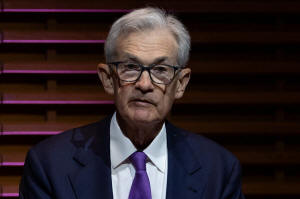Powell sticks with Fed's cautious rate-cut strategy
 Send a link to a friend
Send a link to a friend
 [April 04, 2024] By
Howard Schneider and Abhirup Roy [April 04, 2024] By
Howard Schneider and Abhirup Roy
STANFORD, California (Reuters) -Federal Reserve officials including U.S.
central bank chief Jerome Powell on Wednesday continued focusing on the
need for more debate and data before interest rates are cut, a move
financial markets expect to occur in June.
"Recent readings on both job gains and inflation have come in higher
than expected," Powell said in a speech to the Stanford Graduate School
of Business. While policymakers generally agree that rates can fall
later this year, he said this will happen only when they "have greater
confidence that inflation is moving sustainably down" to the Fed's 2%
target.
His remarks repeated language the Fed has adopted as it tries to balance
the risks of cutting interest rates before inflation is truly controlled
with the risks of suppressing economic activity more than is needed.
As new data arrives, however, as many questions have been raised as
answered.
In separate comments to CNBC on Wednesday, Atlanta Fed President Raphael
Bostic said rates should likely not be reduced until the fourth quarter
of this year. Bostic anticipates only one quarter-percentage-point cut
will be appropriate in 2024, well below the three or more cuts most of
his colleagues anticipate.
"We've seen inflation kind of become much more bumpy," Bostic said. "If
the economy evolves as I expect, and that's going to be seeing continued
robustness in GDP and employment, and a slow decline in inflation over
the course of the year, I think it will be appropriate for us to start
moving down at the end of this year, the fourth quarter."

Few other Fed officials have been as specific in their public remarks
about the interest rate outlook as Bostic, however.
Fed Governor Adriana Kugler, for one, agreed with the assessment from
Bostic, Powell and other officials that recent progress on inflation has
been "bumpy." Still, Kugler said in comments at Washington University in
St. Louis, "I expect the disinflationary trend to continue" and help
pave the way for rate cuts over the course of the year.
"If disinflation and labor market conditions proceed as I am currently
expecting, then some lowering of the policy rate this year would be
appropriate," she said, without commenting on the timing or extent of
policy easing she expects.
The Fed last month held its benchmark overnight interest rate steady in
the 5.25%-5.50% range, where it has been since July.
[to top of second column] |

U.S. Federal Reserve Chair Jerome Powell speaks at the 2024
Business, Government & Society Forum at the Stanford Graduate School
of Business in Stanford, California, U.S., April 3, 2024.
REUTERS/Carlos Barria

'LATER THIS YEAR'
Powell's prepared remarks and answers to questions at the event in
Stanford, California, broke no new policy ground.
As he did at his press conference at the end of the Fed's last
policy meeting on March 20, Powell maintained the baseline outlook
that rates will fall "later this year," and said that recent data
did not "materially change the overall picture which continues to be
one of solid growth, a strong but rebalancing labor market, and
inflation moving down toward 2% on a sometimes bumpy path."
But neither has he hinted at when the Fed might loosen its grip on
credit, with upcoming jobs data, including the March nonfarm
payrolls report on Friday, and incoming inflation readings next week
important in shaping the outlook for the central bank's April 30-May
1 and June 11-12 policy meetings.
"Given the strength of the economy and progress on inflation so far,
we have time to let the incoming data guide our decisions on
policy," Powell said, with decisions made "meeting by meeting.
Inflation, based on the Fed's preferred measure, remains half a
percentage point or more above the central bank's 2% target, and
recent progress has been minimal.
"January and February showed a bit of firming in the inflation
data," Kugler said.
But she also said recent inflation numbers "featured some atypical
or seasonal factors that suggest a need to withhold judgment" before
deciding that last year's rapid progress back to the Fed's 2% target
had indeed slowed.
Rather, Kugler said, she felt there was "still a bit of room" for
supply improvements to slow the pace of price increases, "especially
in the services sector, where solid labor supply growth will
continue to ease wage and inflation pressures."
(Reporting by Howard Schneider in Washington and Abhirup Roy in
Stanford, CaliforniaAdditional reporting by Lindsay Dunsmuir and Dan
BurnsEditing by Paul Simao and Matthew Lewis)
[© 2024 Thomson Reuters. All rights
reserved.]
This material may not be published,
broadcast, rewritten or redistributed.
Thompson Reuters is solely responsible for this content. |